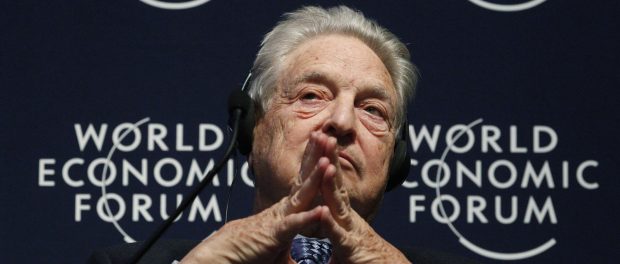Soros calls Xi ‘the worst enemy of free societies
Courtesy of RT News: Published time: 25 Jan, 2019
 FILE PHOTO © Reuters / Christian Hartmann
FILE PHOTO © Reuters / Christian Hartmann
Beijing brushed off Soros’ attack.
“It’s obvious who is opening doors and building roads and who is closing doors and building walls. Statements by certain people, which portray black as white and distort facts, are completely pointless and not worthy of even a rebuttal,” said Chinese Foreign Ministry spokesperson Hua Chunying.
“China isn’t the only authoritarian regime in the world, but it’s undoubtedly the wealthiest, strongest and most-developed in machine learning and artificial intelligence,” said Soros, known for using his money to organize and support movements against the governments he deems oppressive.
The “main source of hope” against Xi are the Chinese people, whose aspirations, according to Soros, are sharply distinct from the regime’s. Hedge fund billionaire Soros runs the Open Society Foundations (OSF), a vast grant-giving network with the stated goal of making governments open to participation and accountable to the people.
“We hope the relevant American can correct his attitude, not be shortsighted, and hold an objective, rational and correct opinion of China’s development,” Hua added.
Soros’ controversial political ventures include attacks against US President Donald Trump, donating to campaigns promoting a second Brexit referendum in the UK, and helping along the Ukrainian revolutions in both 2004 and 2014, among others. This has earned him the adoration of liberals around the globe and got the OSF banned in Hungary and Turkey. It’s also on the list of “undesirable” organizations in Russia. Trump and his supporters have accused the billionaire of funding protests against the US president – accusations that have been branded conspiracy theories and anti-Semitic. Soros, the Financial Times “person of the year” for 2018, is also at odds with Facebook and Google. He called the tech giants a “menace” during his Davos speech last year.
Soros’ controversial political ventures include attacks against US President Donald Trump, donating to campaigns promoting a second Brexit referendum in the UK, and helping along the Ukrainian revolutions in both 2004 and 2014, among others. This has earned him the adoration of liberals around the globe and got the OSF banned in Hungary and Turkey. It’s also on the list of “undesirable” organizations in Russia. Trump and his supporters have accused the billionaire of funding protests against the US president – accusations that have been branded conspiracy theories and anti-Semitic. Soros, the Financial Times “person of the year” for 2018, is also at odds with Facebook and Google. He called the tech giants a “menace” during his Davos speech last year.
Beijing brushed off Soros’ attack.
“It’s obvious who is opening doors and building roads and who is closing doors and building walls. Statements by certain people, which portray black as white and distort facts, are completely pointless and not worthy of even a rebuttal,” said Chinese Foreign Ministry spokesperson Hua Chunying.
“We hope the relevant American can correct his attitude, not be shortsighted, and hold an objective, rational and correct opinion of China’s development,” Hua added.
Hedge fund billionaire Soros runs the Open Society Foundations (OSF), a vast grant-giving network with the stated goal of making governments open to participation and accountable to the people.
Soros’ controversial political ventures include attacks against US President Donald Trump, donating to campaigns promoting a second Brexit referendum in the UK, and helping along the Ukrainian revolutions in both 2004 and 2014, among others. This has earned him the adoration of liberals around the globe and got the OSF banned in Hungary and Turkey. It’s also on the list of “undesirable” organizations in Russia.
Trump and his supporters have accused the billionaire of funding protests against the US president – accusations that have been branded conspiracy theories and anti-Semitic.
Soros, the Financial Times “person of the year” for 2018, is also at odds with Facebook and Google. He called the tech giants a “menace” during his Davos speech last year.